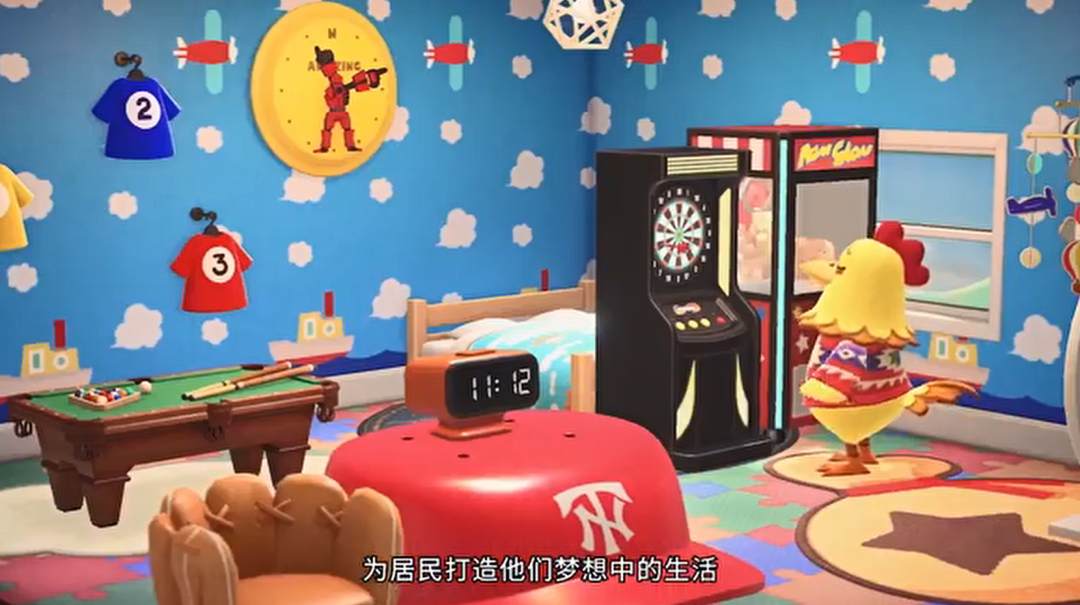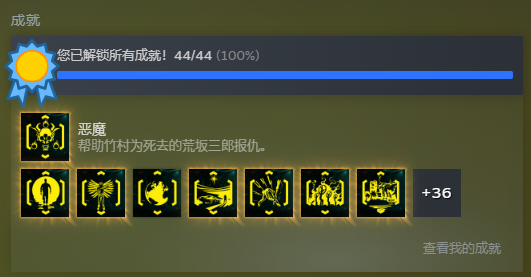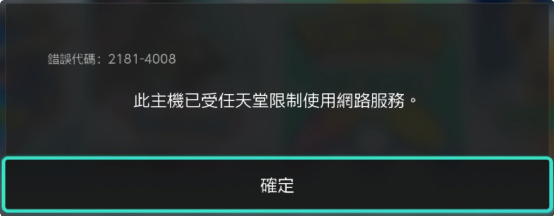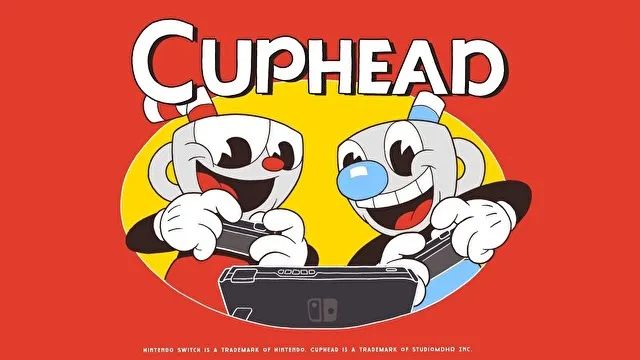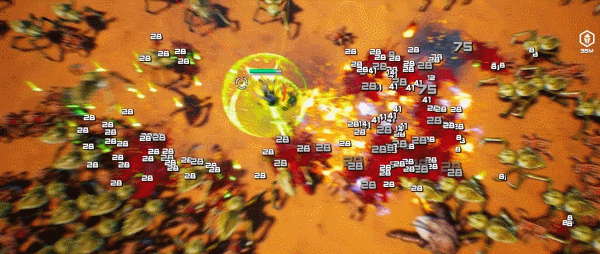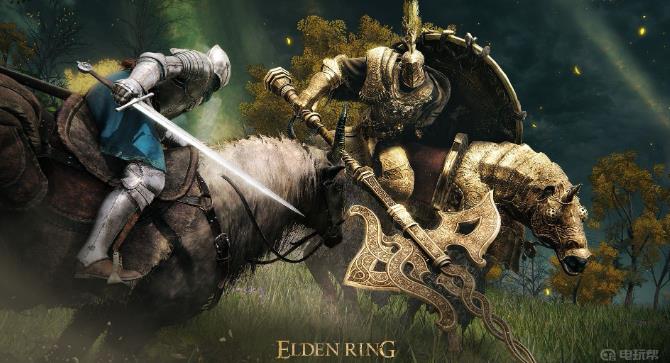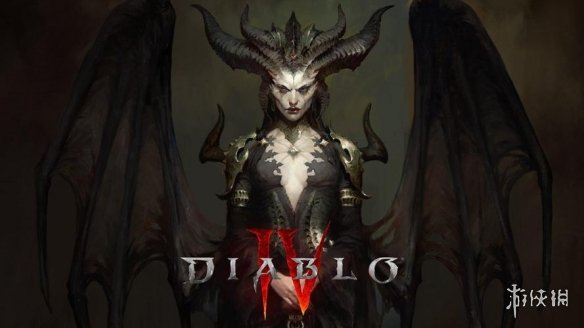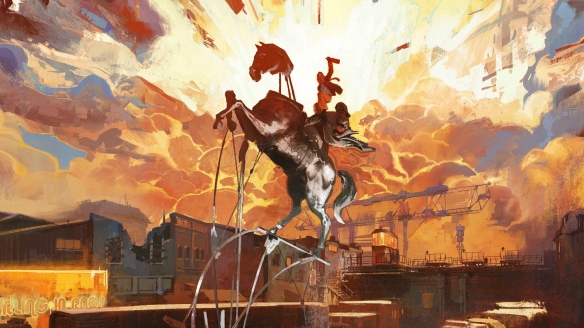
親愛的心友們,大家好,我是超高校級的心理委員。
在之前《彈丸論破中的希望和絕望是什麼?》的視頻和專欄里 ,我通過狛枝和盾子這兩大彈丸圈內公認的「教主」,來分析了一下,彈丸論破中希望和絕望的引申義,以及他們給社會帶來了什麼,反映了什麼樣的社會思想。
然而,上一期友小夥伴反饋:狛枝凪斗似乎不能代表希望陣營的整體意志。
換言之,教主一詞,更多是一種戲稱與代指,並不意味著他的思想精神,能夠代表所有人對希望的理解。
仔細回想,確實如此,苗木誠、七海千秋與狛枝凪斗對希望的觀念,可以說是截然不同的。這種差異,讓他們與狛枝之間,形成了明顯的對立感。其中最為明顯的,莫過於苗木誠與狛枝凪斗的價值觀差異了。
本期,我將從價值觀層面與MBTI榮格八維,以及一點點九型人格的角度,來系統地探討一下狛枝與苗木對希望理解上的差異。
 本位不同
本位不同苗木誠與狛枝凪斗的希望觀差異,基本上都可以在「本位」這個概念上找出來。
何為本位,大家可以理解為「以什麼為根本」或「以什麼為基本遵循」。當世界以黃金這一貴金屬作為本位貨幣時,黃金將作為衡量紙幣、其他錢幣購買力的根本,我們稱其為「金本位(Gold Standard)」。
而在「人的希望」這一主題上,狛枝與苗木的分歧點,大多是集中在何為本位上。也就是說,狛枝是以抽象的希望為本位的,而苗木,是以具體的人為本位的。以此為結論,我們可以解釋他們許多行為上的分歧。

狛枝凪斗追求著人的希望,但他對希望本身的優先順序要高於人。在他眼中的人們是高度抽象的概念,或者說,拋開「希望」和「絕望」這些高度抽象的概念以外,其他的部分已經不重要了。因此,為了讓希望成長,為了讓希望戰勝絕望,他會選擇通過煽風點火,來犧牲人的生命,以實現希望。
而究竟什麼代表著希望呢,如何判斷一個人是否是希望的象徵呢?
一個抽象概念的詮釋,往往需要另一個沒那麼抽象的概念。於是,教主在對人類社會的洞察中發現了「才能」與「希望」之間的強關聯。於是,這成為了才能象徵希望這一推論的一個邏輯前提。
苗木誠支持著人的希望,但最終的落腳點是人,而不是希望。對於苗木而言,希望並不是一種高度抽象與凝練的概念,而是蘊含在人身上的。換言之,有人就有希望,或者說,有人才有希望。必須用盡一切辦法去把人保住,把生命保住。
於是我們可以看到當盾子說自己要給自己處刑時,苗木誠本能性地產生了阻止盾子尋死的念頭。而在未來機關下令要殺死二代眾這些個絕望殘黨的時候,苗木誠也是執意要包庇他們,還要偷偷送去做思想改造。
無論在什麼時候,苗木的觀念一直是「以人為本」和「人命關天」的,在希望和人之間,苗木想必會堅定不移地選擇「人」。而狛枝凪斗則用他的所作所為告訴我們,他會堅定不移地選擇「希望」,即便犧牲人命。
至此,我們便理解了兩者希望的主要異同:
他們的相同點在於,都在追求希望,也都有幫助他人實現希望的傾向,也存在一定的成為希望的潛質與意願。在不同點在於,一個把人看得大於希望,一個把希望看得大於人。

只是,僅僅得出這個結論,似乎也有些太淺了。只知其然,而不知其所以然,似乎並不能完成我們「人物分析」的這一目標。
因此,接下來,我將從MBTI榮格八維和九型人格,這兩個人格類型理論工具,來系統地分析,他們理念差異的成因。
 榮格八維分析
榮格八維分析在往期的彈丸論破人物分析中,我們有系統地分析過苗木誠與狛枝凪斗的MBTI,分別是ENFJ教育家和INFJ引路人。
(考慮到有許多人並不認可這一結果,我會在文末引用一段解析,大家可以自行討論)
考慮到並不是所有人都對榮格八維有較為深入的了解,本期只討論他們的前兩個功能,也就是Fe(外傾情感丨Extrovert Feeling)和Ni(內傾直覺丨Introverted Intuition)。
Fe常常與關注他人情感需求,把握人際關系與氛圍相關聯。而Ni則常常與洞察事物本質與趨勢,把握抽象概念相聯繫(這裡簡單講講,詳細版會放在文末)。
在榮格八維的理論模型中,苗木誠的功能序列是ENFJ,這套函數是以Fe為主導功能,Ni為第二功能,也就是輔助功能的。
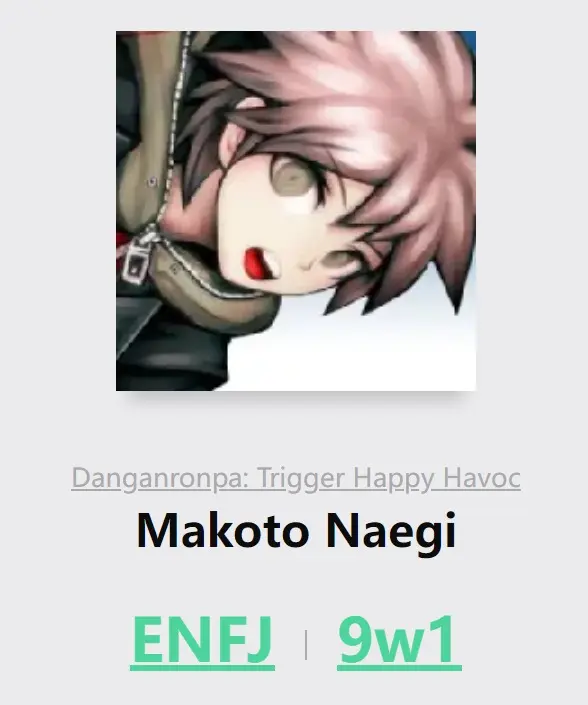
一個人的主導功能,常常反映其核心追求。而輔助功能,則通常是充當工具人,以滿足第一功能的追求的。
也就是說,苗木誠最為核心的追求,更傾向於他人的需求,群體視角下大家的情感傾向(Fe主導)。而他的第二功能Ni(內傾直覺),更多的是作為一個滿足Fe需求的工具,用以洞察他人的想法,以及看到他人身上的潛質。
就算是面對絕望殘黨和沒有才能的普通人,苗木顯然也能從他們身上看到閃光點與潛質,不願意放棄他們,而是試圖將他們引上正途。
而狛枝凪斗的功能序列是INFJ,是以Ni為主導,Fe為輔助的。
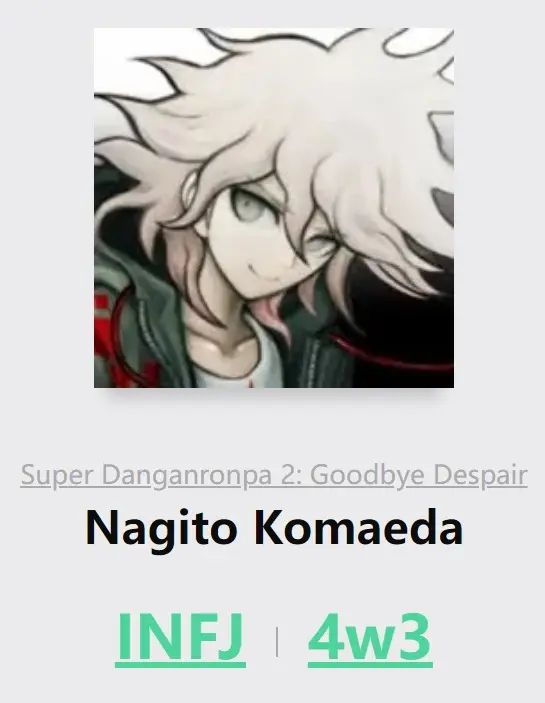
因此,狛枝凪斗最為核心的追求,是把握人與社會的發展趨勢,同時最大限度地抽象出其中的本質概念,用以強化自己對世界的認知(Ni)。
因此,我們常常會看到狛枝會對事態未來的發展作出預測,疑似偷看劇本。也常常說著一些大家聽不懂的抽象概念,並認為那是接近本質的抽象。
值得一提的是,Ni作為感知功能,是不帶任何價值觀和邏輯理性色彩,它只是一種感受方式,就像你用眼睛看,用耳朵聽,用手觸摸來感受世界一樣的道理。
Fe作為輔助功能,常常被狛枝用作「實現希望」的工具。例如用情感話術煽動大家,蠱兮兮地勾出廚師心中的殺人慾望,同時與大家敵對時,用各種心理戰去誘導大家往錯誤的方向漸行漸遠,以此完成他極為複雜的案件設置。
由此,我們可以看出,人與希望的優先順序,也許能用榮格八維來進行一定的解釋。
在苗木誠的心中,Fe代表的是核心追求,Ni僅僅是輔助。換成彈丸世界觀下的語境,便是,人最重要,希望只是輔助人向好的精神力量(工具),本質上還是要保人。
在狛枝凪斗的心中,Ni代表的是核心追求,Fe僅僅是輔助。換成彈丸世界觀下的語境,便是,世界朝著希望的方向發展最重要,人只是希望的載體,本質上,世界是希望的成長史。
然而,許多MBTI愛好者會認為,比起其他的ENFJ,苗木誠似乎特點並不鮮明,沒有其他ENFJ那種特別明顯的小太陽特質,也不像他們那樣本能性地領導團體(如赤松楓、舞園沙耶香和灶門炭治郎)。
此外,比起其他的INFJ,狛枝凪斗似乎過於在意自己的內心感受,並無時無刻不將其以一種反常的形式表達出來,甚至讓人有了狛枝是Fi陽面的感覺,並不像其他INFJ那樣有沉穩、含蓄的外在表現(普奇神父、艾莎和真宮寺是清)。
這裡,我們引入九型人格,來進行討論。
 九型人格分析
九型人格分析
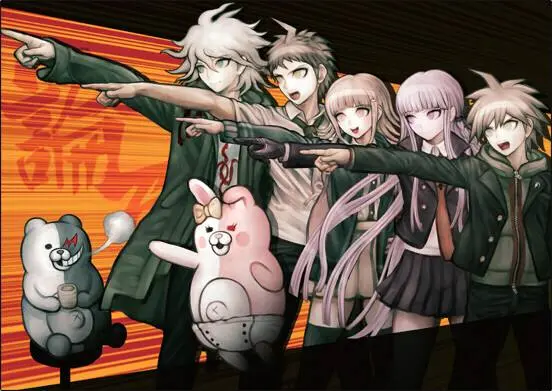
苗木誠的九型人格更傾向於被認為是9w1,跟心委的九型一樣。
9號人格也被稱為和平型或和平主義者,會優先考慮維護大家的和平氛圍,盡量避免衝突。這可以解釋為什麼苗木會在十神和大和田快打起來的時候,跑去勸架(雖然自己被打暈了)。
在這一內心本能下,9號人格有時會為了較為和平與舒適的氛圍,而刻意不彰顯自己的個性,從而減少糾紛。這也可以解釋為什麼苗木誠的個性並不外顯,並以此為自己的特點(「我就一普通高中生」)。
1號人格被稱為完美型,9w1的意思,是核心人格為9,外在表現為1。
9w1會通過盡力把事情做好,來維護大家的和平。相比9w8的葉隱康比呂,9w1的苗木誠會更多地表現出認真與嚴謹的態度,全力以赴且盡職盡責地應對接下來面臨的一切,給人十分靠譜的感覺。
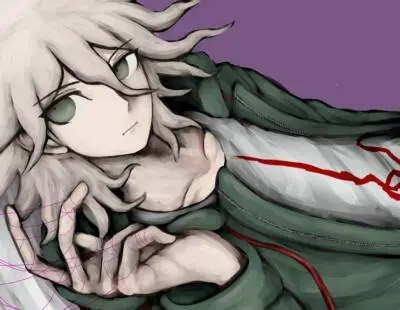
的九型人格傾向於被認為是4w3。
4號人格被稱為自我型或浪漫型、藝術型,會聚焦於對自身情感與自我的觀察,健康的第四型是自我反省的、自覺的,不斷「尋找自我」,和感覺與內在沖力有密切連繫。對自己和對他人都很敏感、直覺。他們會自我表現,很有個性,個人主義。
狛枝凪斗會本能性地探索最深層的自我,挖掘自己內心的渴望,並將其以一種十分藝術化、戲劇化的方式去表達出來,但因為這些情感表達過於個人化,很多時候會讓人感到不解。
3號人格被稱為成就型,也有稱成功型,表演型。比起自閉到底的4w5,4w3們更傾向於投身於外界事物與人際關系,通過自己的努力,去實現4號對自我內心情感的追求。狛枝內心渴望見證希望,因此,他想要通過自己對人和事的把握,通過自己動手推動,來實現這個成就。
 結語
結語本期分析內容就到此結束了,乾貨有點多,要考慮到大家的接受度,寫得還蠻辛苦的。專欄賺的不多,希望大家多多支持┭┮﹏┭┮
因為會有很多好奇寶寶來問問題,所以這裡把Fe和Ni的詳細詮釋,以及一些對這兩個人物的分析資料放在後面了,需要的話可以自行觀看喔~
 Fe和Ni詳解
Fe和Ni詳解Fe是一種判斷功能,常常是關系導向的,傾向於把握外部世界的人際關系(例如,他人的情感/需求,群體的意志與氛圍等),以此指導自己的行為。
發展較好的Fe使用者,會很好的把握他人的情緒,以較為舒適的社交禮儀去照顧到他人的需求與感受,給人如沐春風的感覺。
Ni是一種感知功能,常常關注事物的發展趨勢和本質,追求對事物未來趨勢的把握。在此驅動下,常常會有希望把握「全知」視角的一面。
發展較好的Ni使用者,會看穿許多人或事的發展方向,並對結果作出一個預測。經過良好的訓練,Ni使用者會有極強的洞察力,給人一種偷看劇本的感覺。
 外網PDB上的人物分析
外網PDB上的人物分析苗木誠:
ENFJ totally. His FE is highly developed, in fact in the series we can see that he can easily understand people's feelings and often it seems that he hardly cares about himself. His NI is developed but not dominant, it is based a lot on his intuition that is sometimes good and sometimes bad, he grasps the patterns very well thanks to his tertiary SE that goes to play with the NI. As for the tritype I don't think it's 926, but 927, by the guys the 6 isn't really like him. The most optimistic guy in the world, I've hardly ever seen him worried, and he doesn't pay much attention to his insecurities. One of my favorite characters, well done and different from many others.
狛枝凪斗:
Komaeda may seem like he values Hope through Fi, but he actually perceives everything through the lens of Hope. The synthesis of all perceived objects into one solid subjective perspective is Ni, not Fi. Contrary to Ne, which diverges from one single abstract point, Ni takes many points and connects them to a single meaningful point. In other words, everything Komaeda sees and experiences connects to this one point: Hope. It is easy to confuse, since Ni and Fi are both connotative functions. Rather than an individualistic, contextual Fi/Te judgement, Komaeda employs a collective, universal Fe/Ti judgement. Talent is the main judgement he enforces, insisting that there are only two kinds of people: the talented and the untalented. There is no contextual nuanced individualism that's necessarily seen in an Fi judgement. Instead, he claims that society as a whole (Fe) runs on an algorithmic underlying principle (Ti), and tells it from his own subjective perspective (Ni): if someone is untalented, they are as useless as garbage. > "For a long time, humans have been taught that if you try hard enough, you can accomplish anything. Even if we weren't told this directly, you'd know it just by looking at the world around us. The internet, TV, and newspapers are overflowing with hopeful messages that say exactly that... But people who can't win...people who don't try to win...people who try their best and still can't win... ...They are all worthless trash." There is no subjectivity in the feeling realm. The judgement would have to be exclusively aimed at himself or another individual. Instead, there is impartial awareness of how society as a collective (Fe) works - based on an infallible algorithm (Ti). Furthermore, when Komaeda looks at the Ultimates, he does not see individual people, nor does he value them as individuals. He values them conceptually, which is common of Ni-Fe: viewing humans impersonally and non-subjectively (Fe/Ti) through the lens of their own personal meaning (Ni) Even if you still wish to argue for Fi, INFJ have 6th Fi. Fi will be more prominent in them than in INTJ. The difference is that they will not value it. They may even loathe it, viewing it as selfish. We can see this consistently in Komaeda, who insists that the Ultimates solve the mysteries, even when he already has everything figured out. He reduces his value as in individual to shine light on the group. However, we occasionally hear his Fi crying for help; he unconsciously wishes to be someone significant. There is no conscious wish because Fi is not conscious for INFJ - Fe is, and it reinforces the belief that his unconscious Fi dream is impossible based on how society works. There is also a hatred of Te in him. He despises the idea that the talentless can ever be anything superior to trash, no matter how hard they try. This is completely contrary to a Te perspective. Te/Fi wishes to assert it's individual will above that of other individuals - to grow stronger than other, in whatever way they are wishing to. Ni-Te wishes for efficient, objectively measurable growth. Komaeda literally does not believe that this is possible, which is what Te blindness typically looks like. Instead of growth, he advocates for Ti principles that remain logically consistent and infallible throughout time and circumstance. His thought process looks like this: "Growth is impossible because it is illogical. No one else can grow, and I can observe this in the real world (Ni/Se), so there is no reason to believe that I, as an individual, am capable of growth (devaluation of Fi/Te)." I also just think that Fe blindness is kind of absurd. Think of Maki, Kirigiri, and Kamukura. What differentiates them from Komaeda? They are expressionless, unable to see any value in objective expressions of feeling - why should they need to prove what they feel inside with expressions? They are blunt and matter-of-fact - uncaring about what others think of them. Komaeda, on the other hand, is quite polite. His brand of "bluntness" is more akin to social awkwardness, which is possible for any introverted type - even IxFJ. It is accidental - a short break from his usual sunny, polite demeanor. He is expressive, aware of social rules, and even worries excessively about what Hinata might think of him, as seen in his "Shot through the Heart" event. I think that the vote change is progress, for sure. There is absolutely no way that Komaeda is an Ne type, o and no one has provided adequate evidence to suggest otherwise. That being said, I think that Fi/Te vs. Fe/Ti has been the real center focus of debates all along, and I think that criticqlal evidence has been dismissed based on the stereotype that Fe types will always do what is selfless. Fe is not selflessness, and Fi is not selfishness. Fe is not dishonesty, and Fi is not honesty. The problem here is that those are behavior-based judgements, when MBTI is a theory about *cognitive* functioning.


